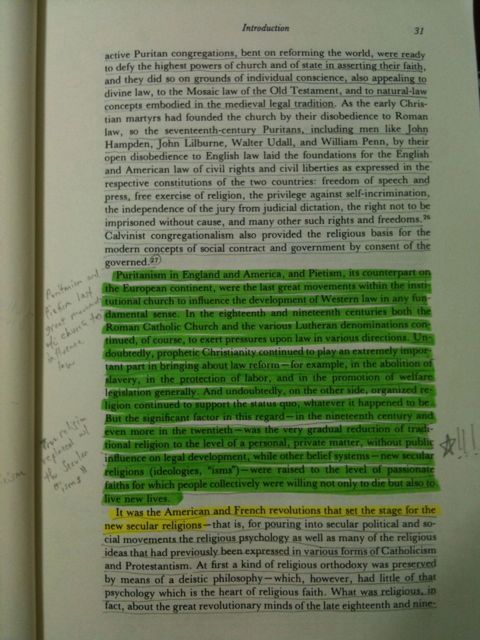 This strange-looking picture is of a page of one of the books that I have mentioned in several of my posts, Law and Revolutionby the late Harold J. Berman. It gives, for those interested, an idea of how I read and mark-up a book. More importantly, the green-highlighted quote is a powerful statement of why the church has ceased to impact the world in a fundamental way, and it is also a statement of why most Christians fail to live out their faith vibrantly in all that they do. Os Guinness in his great book The Call uses the word “privatization” to refer to this phenomenon. Thus, the question that serves as the title of today’s post — “have you been privatized?”
This strange-looking picture is of a page of one of the books that I have mentioned in several of my posts, Law and Revolutionby the late Harold J. Berman. It gives, for those interested, an idea of how I read and mark-up a book. More importantly, the green-highlighted quote is a powerful statement of why the church has ceased to impact the world in a fundamental way, and it is also a statement of why most Christians fail to live out their faith vibrantly in all that they do. Os Guinness in his great book The Call uses the word “privatization” to refer to this phenomenon. Thus, the question that serves as the title of today’s post — “have you been privatized?”
In case you can’t read it in the picture, here is the quote from Prof. Berman:
Puritanism in England and America, and Pietism, its counterpart on the European continent, were the last great movements within the institutional church to influence the development of Western law in any fundamental sense. In the eighteenth and nineteenth centuries both the Roman Catholic Church and the various Lutheran denominations continued, of course, to exert pressures upon law in various directions. Undoubtedly, prophetic Christianity continued to play an extremely important part in bringing about law reform — for example, in the abolition of slavery, in the protection of labor, and in the promotion of welfare legislation generally. And undoubtedly, on the other side, organized religion continued to support the status quo, whatever it happened to be. But the significant factor in this regard — in the nineteenth century and even more in the twentieth — was the very gradual reduction of traditional religion to the level of a personal, private matter, without public influence on legal development, while other belief systems — new secular religions (ideologies, “isms”) — were raised to the level of passionate faiths for which people collectively were wiling not only to die but also to live new lives.
This privatization, which is not used here in the sense of returning state-run entities to private hands as a means of combating socialism, is deadly to the church and ultimately to the culture. Prof. Berman poignantly states its effects on the law, but the truth is that it leaves virtually no part of modern life untouched.
So, what we have is a sort of dualism. Spirituality, faith, and religion are celebrated and encouraged, to a point. They are celebrated and encouraged to the extent that they do not interfere with or undermine what has become the new religion of the West — naturalistic, secular humanism. You are free and even encouraged to believe whatever you want in your own private life, but don’t expect to be able to bring it into the public sphere in any way.
In other words, religious arguments in the public square are considered to be prima facie invalid. Even many Christians fall into this error, arguing that religious arguments have no place in politics, law, science, medicine, and other public issues. This relates to the fallacy of neutrality, a clever piece of propaganda developed by the proponents of secular orthodoxy that claims that only naturalistic, secular humanist arguments should be allowed in the public square because these are the only arguments that are neutral. Therefore, these are the only arguments that should be used to direct law, policy, science, etc.
The correct response to this is “Hogwash!” There is no such thing as a truly neutral argument in this sense. Every argument comes from a set of presuppositions, a worldview. This is true for the Christian, the Muslim, and the self-styled “neutral” secularists alike. Secular humanists have a worldview and a religious dogma. Further, they recognize and punish heresy, and this “neutrality” argument is one of the ways they do it. Don’t believe me? Try to be a proponent of intelligent design and get a job teaching science in one of the government schools (at any level.) You will quickly find out that the persecution of heretics in America is alive and well.
Thus, one of the things that the church must do is resist this false teaching of privatization that has rendered the influence of Christianity and the Bible so impotent in our times. We must commit ourselves afresh to the truth that Jesus is the Lord and King of all, and we must be willing to unashamedly argue from this position in the public square.
That being said though, I think we need to return to the question of the post — “have you been privatized?” If you agree that religious arguments have no place in the public square, and that only “neutral” secular arguments should be present, then yes, you have been privatized. If you have been privatized, then the answer is, of course and as always, to repent.